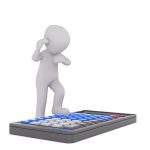Back to: Starting your business
Accounting for your business
Even for a very small sole-trader business you need to keep some accounts. You must do this to separate your business and personal accounts on paper if not actually in different bank accounts.
Being a small company you have two accounting options:
- ‘Cash Basis’ Accounting.
- Traditional accounting (an option for the self-employed but a requirement for a limited company).
Cash Accounting
Cash basis accounting is the way to work out your income and expenses for your self-employed business or partnership and is used to fill in your self-assessment tax returns.
Remember to keep all of your invoices, receipts and bills to submit with your tax return. Modern banking and accounting applications will do this for you online and help you file your tax return no matter what your business size.
Traditional Accounting – The Basics
Let’s start off with some of the most common terms and the bits that make up a simple financial report.
In traditional accounting and business reporting, there are three key elements to manage in a business:
- The profit and loss account –
- The
 balance sheet
balance sheet - Cash flow statement
Hopefully, your business will sell some goods and/or services, make or develop services, and have some kit.
Expenses and costs
The rules regarding expenses, things you can claim for as your business ‘needs’ before your taxes are calculated. This can include cost of heating your home, broadband, phone and vehicle expenses as well as specialist tools etc.
The rules are complicated and change with every budget. We cover the details in our other courses but you should check with an accountant or the HMRC for any recent changes.
Tax
If you’re self-employed, you need to send HMRC a Self-Assessment tax return each year. Self-Assessment is a system HMRC uses to collect Income Tax (often just called “tax”) and National Insurance contributions.
Many banks provide business accounts and accounting software so that your accounts can be filed online as part of the making tax digital – this is a requirement for many businesses.
If you’re going to work in the construction trade, the HMRC has even created a tax category for the construction trade sub-contractor to prevent illegal cash in hand payments systems and to protect the self-employed from exploitation.
As a limited company you have to submit annual accounts to Companies House and file them with HMRC online.
You can find out more by doing our course on business planning or your specific business type – sole trader, limited company or partnership.
National Insurance and pensions
As a self-employed person, you must pay a fixed amount of Class 2 National Insurance Contributions (NIC). After all the tax calculations and offsets you must consider in your accounts, if your profits are above a certain limit, you may also pay Class 4 NIC.
You can read more about this in our courses or on the HMRC NI website.
Remember that if you have employees you have considerations regarding the minimum wage and the workplace pension.
Whatever you business size, you should try to save your National Insurance and a personal pension – saving for the future!
The business planning and type courses cover these in more depth.